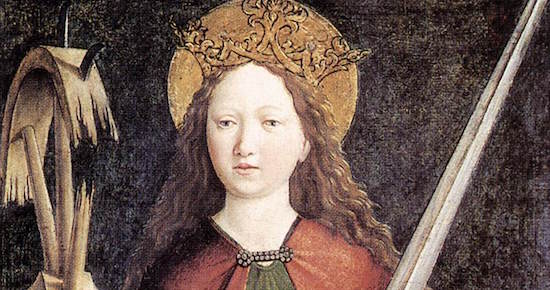The details of the 4th century life of St. Catherine of Alexandria are painstakingly woven into the lore and song and symbolism of St. Catherine University, a Catholic college in Minnesota where I taught for many years.
But 10 years ago this month, in my last semester on the faculty, I learned that Catherine, the namesake of the university, never existed at all — and that the Catholic Church had known this for decades.

The idea of religious figures failing to move the needle on existence is hardly new to me. But saints are supposed to be the exception. Like the recently canonized Mother Teresa, the fact that saints were once people of the you-and-me variety is very much the point. And in 15 years at the college, I’d never even heard it suggested that the place was named for a fictional character.
As it turns out, Catherine was removed from the calendar of saints by the Catholic Church in 1969, along with 200 others, due to “insufficient evidence of historicity”— a phrase meaning “they were just pretend.” Catherine was at the bottom of the class, one of 46 saints on the list whose existence was even more strongly declared “seriously doubtful.” Others removed at the time were St. Christopher and St. Valentine.
(None of these were actually de-canonized, by the way — they were just removed from the liturgical calendar. Once you achieve sainthood, no scandal can impeach you — not even being outed as a mere plot device.)
Though the church itself had decided Catherine was almost certainly a myth, there was little felt need to make this known. From museums to Catholic schools and websites, her story is still dutifully recounted in elaborate historical detail:
Colleges and cathedrals named for known fictions continue to act as if nothing has changed. Millions still pray for the intercession of characters who the hierarchy knows are no more capable of hearing them than Daenerys Targaryen.
I asked several faculty colleagues if they knew about Catherine’s quiet demotion. None of the non-Catholics did, and all were properly floored by the news. Of the Catholic faculty I asked, some knew and some didn’t, but all of them shrugged. Not one had a problem with a known fiction being presented to the masses as true.
Here’s where it gets much worse.
Catherine’s story tells of a noble Christian woman steadfastly defending her beliefs, then being tortured and executed on a wheel by a pagan king for rejecting the pagan religion. But scholarship suggests that “Catherine’s” biography was most likely borrowed whole cloth from the actual philosopher, mathematician, and astronomer Hypatia of Alexandria, who, according to Socrates Scholasticus, “made such attainments in literature and science, as to far surpass all the philosophers of her own time.”

So why didn’t the early church just make Hypatia a saint? Because of a sore spot in her résumé: Hypatia was not a Christian.
So an imaginary double was created in her stead, christened Catherine, and martyred dramatically, if ironically, for the one attribute the real person did not possess: Christian faith.
The irony goes deeper still: Scholasticus and other credible contemporaries report that Hypatia was murdered by a group of Christian monks, an assassination later applauded in the Chronicle of John, Bishop of Nikiû for “destroy[ing] the last remains of idolatry in the city.”
This cements the demented irony of the eventual identity theft: a pagan woman murdered by Christians for her beliefs was transformed into a Christian woman murdered by pagans for her beliefs.
Imagine an all-white college searching for a namesake. They learn of this amazing man named Martin Luther King, Jr. But he won’t do, for obvious reasons. So they borrow his life story — right down to “I Have a Dream,” “Letter from Birmingham Jail,” and the march in Selma — then rename him “Steve” and make him a white man who was gunned down by a black man.
The theft of Hypatia’s identity is just that grotesque.
When the time came to teach the final section of my critical thinking course at the college, I included this question on the topic choices for group research: Did Saint Catherine of Alexandria exist?
The students were puzzled by the question. Not one had ever heard that their school might be named for a nonexistent person. But one group took the topic.
It took very little time for them to find the whole story, Hypatia and all. In the process, they learned something I hadn’t known—that “Saint Catherine” was returned to the church calendar in 2002, not as a result of new evidence, but in recognition of her “usefulness as a symbol,” an iconic figure to emulate and to admire.
In the Q&A after the presentation, the (mostly Catholic) students, to their credit, erupted in outrage.
If it were openly acknowledged that the college is named for a fictional character, one student said – if we were all gathered together behind the Wizard’s curtain – that would be different. Instead, they were asked to invoke her concretely, to literally plead for her guardianship of our college, her blessings on us all.
And what does it say about humanity, another asked, that we have to create fictional heroes? Is it even good to require perfection, virginity, and martyrdom before we can admire someone?
At the root of the discussion was a queasy feeling that either blithe incuriosity or willful patronizing was at work here, that the love of these stories had at some level mattered more than the truth. The truth certainly mattered to these students – not whether something was “culturally true,” or “that-which-is-true-but-never-happened,” or any of the other concepts that ought to go find themselves a word that isn’t already defining something else. These students wanted to know the truth, definition 1, about the name that would be on their diplomas.
Finally, someone asked: “And what about Hypatia?”
Yes. What about Hypatia? What does fiction do to the reality it supplants? What about this actual flesh-and-blood woman of actual accomplishments, cast aside in favor of a cardboard cutout? Isn’t there something especially vile about what the mythic Saint Catherine does to the real human person Hypatia?
[What happened next: My last, desperate act of satire]DALE McGOWAN is the author of Raising Freethinkers and Atheism for Dummies. He lives in Atlanta.
















